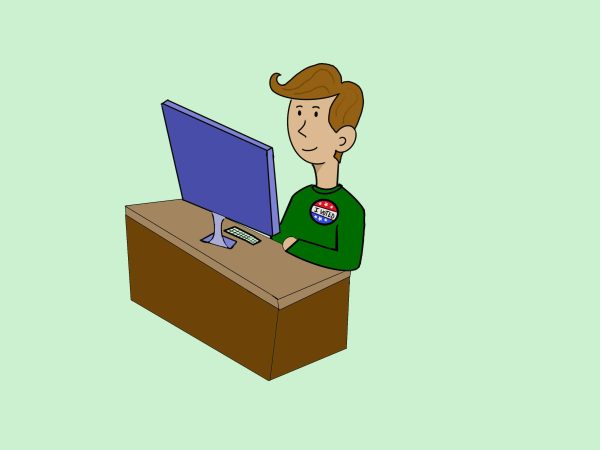

Voting can be a scary process for new voters, but knowing how to conduct research can ease stress. Zeinab Agbaria | The Washtenaw Voice
Sasha Hatinger
Staff Writer
Researching the upcoming election is an imperative step before going out to vote. If students need guidance with their research, help is available.
Rayan Salam, faculty in the communications, media and theater arts department at Washtenaw Community College, encourages students to keep an open mind when researching the upcoming election, and lets students know how to begin their research process.
“The first thing you want to do is, of course, always watch the presidential debates,” Salam said. “You want to identify the key issues that are at hand right now in our current society.”
Dr. Joseph Karas, faculty in the humanities, social and behavioral sciences department at WCC, sheds wisdom on politics and how students can best research the upcoming election.
“Look at news sources with kind of different, contrasting views,” Karas said. “Even if you disagree.”
Doing so will allow students to learn and better understand the different perspectives of the candidates.
Salam also believes that students should research integrally. “When it comes to observing the media critically, we know that we have different political views on the extreme ends of both of the party spectrum.”
She goes on to say, “We have extreme liberal and extreme conservative. We have somewhat liberal, somewhat conservative, and we do have some neutral news sources. I think the best way is to research all of them. Get many different points of views.”
The more students broaden their research of the upcoming election, the better they will understand the views of the political parties they support, or not yet completely understand.
As far as what websites students should use to research the upcoming election, Salam has suggestions.
Two nonpartisan news sources that Salam recommends are Associated Press (apnews.com) and Reuters (reuters.com). To learn more information about voting records and candidate positions, Salam suggests Vote Smart (votesmart.org).
For fact-checking, Salam also mentions that AP Fact Check (apnews.com/ap-fact-check) is a “neutral” source.
In researching all political parties, students will also have a better comprehension and appreciation of politics, and even more so, a clearer understanding of what matters are important to each student.
Discovering what each candidate supports and what issues are important to each candidate is also beneficial during students’ research process.
“This is kind of a dense point,” Karas said. “But as important as the things they are talking about [are] it’s also a signal as to what issues they’re not stressing.”
Noticing what is or isn’t being said by candidates when there is an upcoming election is important for students to be aware of.
This allows students to determine for themselves if their beliefs are in alignment with each candidate they are researching.
Christy Main, Student Activities supervisor at WCC, offers her support and guidance to students interested in politics, and researching the upcoming election.
Main shares information about the Campus Voting Project (CVP), which, according to Main, allows students on campus to become more “civically engaged.”
“We are a nonpartisan group that encourages students to register, or preregister to vote,” Main said. “We put on events throughout campus, especially with this being an election year.”
For those students that are unsure if they are registered to vote, Main suggests visiting, wcc.turbovote.org.
From that website, students can verify if they are registered, get reminder election emails and sign up for text message alerts.
“We are also working with the AARP to do a voting registration event on Sept. 17,” Main said. “Which is also the National Voter Registration Day, and so we’re trying to do a big event partner with them to get students to register to vote, but also to learn about the election and to work with us, so that they feel more confident before they go to the ballot.”
Researching the upcoming election is just part of the bigger picture, getting out to vote is the goal.
“Because today, voting is not just a right,” Salam said. “It’s a responsibility.”
Below are recent employment want ads that have been posted with WCC Center for…
Sasha Hatinger | Staff Writer What's the link between technology and its users' mental health? …
This review may contain spoilers for “The Monkey”, released in theatres on Feb. 21, 2025. …
Pop music gets an upgrade with singing robots in Steampunk suits Lily Cole | Editor …
Lily Cole | Editor ONGOING COVERAGE As new executive orders come out, some of which…
Public safety will follow federal law, verify warrants Courtney Prielipp | Photo Editor Recent…